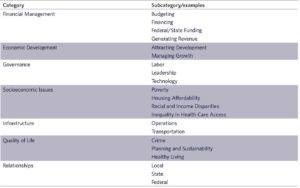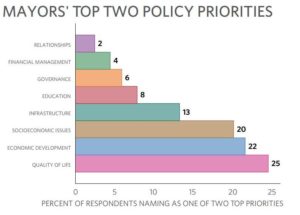Back

Blog
For More and More Mayors, Poverty Tops Issue Agenda
The 2016 Menino Survey of Mayors, named in honor of late Boston Mayor Thomas Menino, uses a series of open- and closed-ended questions to probe mayors about their top priorities. More than 100 mayors participated in the survey, with responses coming from all over the country.

Mayors’ Policy Priorities
For the most part, mayors’ top policy priorities of 2016 were similar to their focus areas in 2014. Most issues shifted by only a few percentage points. The outlier was socioeconomic priorities, which doubled from 10 percent in 2014 to 20 percent in 2016. For the first time, socioeconomic priorities ranked in the top three among mayors.
What’s more, “there is no clear pattern as to the cities that drove this change,” the report states. “While mayors of cities with higher poverty rates were more likely to name priorities in this category, the increase from the 2014 survey was about the same (roughly 10 percentage points) for high and low poverty cities.”

Mayors’ Top Economic Concerns
This sentiment is reflected in the mayors’ top economic concerns, as well. Forty-four percent of mayors ranked poverty as their top economic concern, followed by a shrinking middle class (28 percent) and income inequality (23 percent). A few revealing statistics:
- Cities recognized by their peers for taking strong action to alleviate poverty and spur economic development were geographically diverse. Cities highlighted by the survey included New York, Seattle, Louisville, Dallas, and Salt Lake City.
- Neighborhood affordability was an ancillary economic priority for most mayors (six percent), indicating that the risk of gentrification, while an ongoing concern, was secondary to job creation and workforce development.
- Access to living wage jobs (37 percent) and middle income jobs for residents without college degrees (36 percent) were the top two housing and employment challenges cited by mayors.
Importantly, mayors said that targeted strategies were needed, as opposed to more general poverty alleviation strategies. For instance, one mayor said his office is “really focusing on our most underserved neighborhoods and not relying on those broad job fairs…We started doing these micro-targeted job fairs with a lot of preparation with employers in advance.”
Mayors’ People Priorities
When asked about their “people priorities,” mayors overwhelmingly agreed that local government needed to do more to help poor residents.
This year’s emphasis also revealed the mayors’ concerns over inclusivity. Sixty percent of mayors said they frequently worry about inclusivity. They worry most about black, low-income, Latino, and immigrant residents, respectively. Several mayors said the “single best thing” they can do to promote inclusivity is to ensure public acknowledgement of their presence as valued community members.
One Midwest mayor noted that “power, direct access to power…being able to get [residents] directly to the people that are in governing positions” is critically important. Another suggested mayors should use their position to act as conveners for “these really hard conversations that we need to be having about how our police interact with minority communities, how minority communities are impacted by education and housing and transportation and poverty.” Others expressed the general need to be “warm and welcoming” to underrepresented groups, such as minorities and immigrants.
Implications for Inner Cities
Despite the resurgence heralded in the media, the Menino Survey of Mayors highlights a stark reality: cities are still home to concentrated poverty and need.
Some urban markets may be robust, and overall unemployment rates are trending downward, but not all residents are benefitting from the economic recovery equally. That the surveyed mayors now list socioeconomic issues right alongside economic development, is indicative of the need for an approach that targets inner city socioeconomic improvements through job creation and private sector investment, and presents an opportunity for mayors to use integrated tactics in tackling poverty.
The survey also alludes to the need for geographically focused approaches to promote economic growth and development, as opposed to city-wide or regional strategies. ICIC’s research over decades of study has shown the value of this approach. The recognition of the importance of inclusivity is also timely, and is supported by ICIC’s recent research findings that inclusiveness in entrepreneur support organizations (ESO) leads to more equitable economic development outcomes.
Alleviating poverty in America’s inner cities is no easy task—but we’re hopeful. For the first time, poverty is at the forefront of mayors’ policy agendas. That’s a statement in and of itself.
